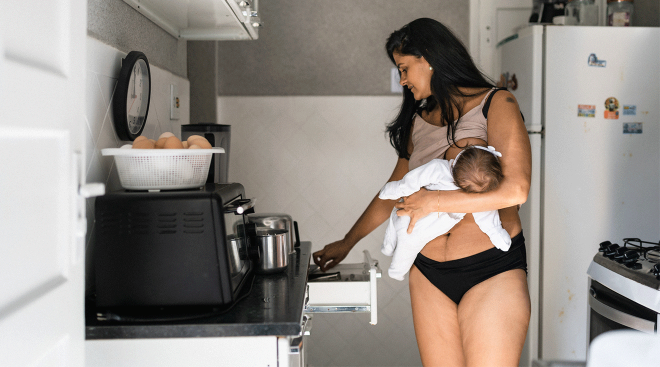- Okay, you might feel like a ticking time bomb. Baby has outstayed their welcome. Don’t be dismayed, many people—especially first-timers—go past their due dates.
- Your doctor will keep a close eye on you now. You may get a nonstress test and/or ultrasound to make sure baby is still thriving.
- You might be tempted to take matters into your own hands to motivate baby. Try taking a walk (we know, you’re waddling!). You can also talk to your ob-gyn or midwife about potentially stripping your membranes. It’s not exactly comfortable, but your doctor will sweep their fingers around the amniotic sac, separating the membranes and releasing hormones that may do the trick to stimulate labor.
Bet you never envisioned being 41 weeks pregnant. But here you are! Because of baby’s extra time in the womb, they may be heavier and more alert at birth than a baby born earlier would be. At this stage, pay close attention to fetal movement and do daily kick counts. If you notice a decrease in the way baby moves, call your healthcare provider immediately.
At 41 weeks, baby is considered fully ready for birth. Their organs have already matured and are fully developed to keep them thriving outside of the womb. That means baby’s lungs, heart and digestive system are all ready to go so you can hear those newborn cries, feel their vibrant heartbeat and clean up that first set of messy diapers–woohoo!
As you await baby's arrival, they’re plumping up a bit more. Your 41-week fetus is growing even longer hair and nails. No wonder some newborns come out with a full head of hair and ready for a mani-pedi!
By 42 weeks, baby continues to pack on weight–about 0.5 pounds per week until they reach their final size! The longer baby sits in the womb cooking, the bigger they get for their long-awaited debut.
How big is baby at 41 weeks?
At 41 weeks, baby is as big as a watermelon. A 41-week fetus likely measures around 20.4 inches long and weighs up to 8 pounds.
41 weeks pregnant is how many months?
When you’re 41 weeks pregnant, you’re 10 months pregnant. Consider yourself an overachiever!
41 week ultrasound
Your doctor may also order a non-stress test and a 41 weeks pregnant ultrasound, to be sure baby is still doing okay in there. This will probably help both of you make the decision of whether or not to induce.
Common 41 weeks pregnant symptoms are a continuation of your other third trimester symptoms. Most notably:
Pelvic discomfort
Baby may be descending lower and lower, putting pressure on your bladder and cervix and giving you more aches and pains down below.
Hemorrhoids
That pelvic pressure causes swollen varicose veins in your rectum, which leads to hemorrhoids. They aren’t pretty, and they may get worse when you push baby out. But eventually the swelling will die down.
Difficulty sleeping
It's the hormones—and your nerves!—that are keeping you from getting a good night’s sleep. You’re not going to be sleeping much after baby arrives, so this is good practice. But it’s also a good idea to rest up as much as possible for the birth.
Frequent urination
Baby is pretty much sitting right on your bladder at this point. Cue another trip to the bathroom!
Contractions
Abdominal tightening is happening more and more noticeably and frequently as baby ramps up for delivery.
By the time you hit 41 weeks pregnant, signs of labor might as well be written inside your eyelids. You probably know this stuff by heart! But just in case, here goes. Call the doctor if you have: a constant leak, which may indicate your water has broken and/or frequent or painful contractions that don’t stop. You will also want to call the doctor if you have any out-of-the ordinary 41 weeks pregnant symptoms, such as bleeding or abdominal pain.
If you’re 41 weeks with no signs of labor, try to be patient! Just because you’re 41 weeks and not dilated doesn’t mean you can’t go into labor tomorrow. It’s really unpredictable like that!
Is it normal to be 41 weeks pregnant?
Completely normal! Remember, your due date isn’t precise; it’s more of an estimate based on a number of factors. So giving birth a week or two on either side of that date is still considered normal. It’s not until you hit 42 weeks that you’re considered “post-term.” So don’t stress—you and baby are doing great!
What causes baby to be overdue?
You’ll never know for sure why baby has postponed their arrival. This is one of those things that runs in the family. So if your mom, sisters or other female relatives have all given birth after 40 weeks, that means you might too. If you’ve already had another pregnancy run into 41 weeks, then don’t be surprised that this one is as well. And of course, it could just be a miscalculated due date and baby’s not really “late” at all!
How far overdue is safe in pregnancy?
Chances are excellent that baby will be healthy if you give birth at 41 weeks. Your OB is keeping a close eye on both of you, monitoring you once or twice a week once you pass your due date. The post-term phase at 42 weeks does pose some increased risks, but don’t worry about that now—you could be holding baby in your arms very soon!
Are you 41 weeks pregnant and fed up? We don’t blame you. Pregnancy after 40 weeks isn’t exactly fun. You’re big, you’re mentally ready for baby and everyone you see says, “you’re still pregnant?!” Go ahead and try every rumored natural labor induction method in the books, as long as it’s safe (so check with your OB first). Eat spicy food (if it doesn’t give you heartburn), walk like crazy, have sex (if you can will yourself to) and maybe try acupuncture (even if you’re a skeptic)!
Your OB may start to discuss the option of having a medical induction at 41 weeks, since babies that go too far past their due date may be at higher risk for problems. Ask the doctor lots of questions about what’s involved and what your specific 41 weeks pregnant risks are. Getting induced does have some positives (like not having to waddle-run into the hospital while in labor!). But there’s something to be said for not rushing baby. Some women say contractions are stronger and more painful during an induction. Others say it’s more comfortable to wait for labor to start at home than it is in a delivery room.
If you choose to have labor induced at 41 weeks, there are several ways it can be done:
Stripping membranes
This is actually a natural induction method, but your doctor will need to perform it. Luckily, it can be done in the doctor’s office and doesn’t require a trip to the hospital. If you’re willing to try this potentially painful procedure, your doctor will sweep their fingers around the amniotic sac, separating the membranes there and releasing hormones that could stimulate labor. This doesn’t always work, but if it does, you could be in labor within hours.
Artificial rupture of membranes (AROM)
Your doctor can break your water for you using a thin plastic hook. This may be done if you’ve been having contractions but labor hasn’t progressed.
Medications
Two types of medication can be used for inducing labor at 41 weeks. A prostaglandin suppository may be inserted like a tampon overnight to start cervical dilation. A synthetic form of oxytocin may be given through an IV to jumpstart contractions.
More than half of pregnancies would surpass 40 weeks if we allowed Mother Nature to take its course. Having said that, you’re not alone if you are feeling a bit (or a lot) discouraged as your due date passes… Occasionally, the body needs to be coaxed into labor (or induced) by using medications, a mechanical approach (balloons that put pressure on the cervix) or releasing your bag of water… At 41 weeks, you and your provider should have a safe plan in place for monitoring your baby and arranging for an induction of labor. Fingers crossed you will not need it!
The struggle is real. Here’s how you can make this time go by a little faster.
Ease hemorrhoid pain
Just when you thought you couldn’t be more uncomfortable at 41 weeks pregnant, hemorrhoids come along. Yow! Find relief with a sitz bath. Soak your bum by sitting in a tub of plain warm water (no soap). One you get out, gently pat the area with a pad that has witch hazel on it.
Walk when you can
Even a short walk can help ease aches and pains, reduce swelling and improve constipation and hemorrhoids—all common 41 weeks pregnant symptoms. (Psst: It may even help kickstart your labor!)
Power off your screens
It’s so tempting to scroll through Instagram or watch Netflix before you go to bed, but you need to shut down to get some shuteye. The blue light emitted from screens can mess with your body clock. That’s a big reason why you may be wide awake at 2 a.m. Stick to a good book!
Follow doctor’s orders
Because your doctor will want to keep tabs on you and baby in week 41, make sure to attend all necessary appointments and get the required tests. And don’t hesitate to call your doctor’s office if you feel anything out of the ordinary, especially decreased fetal movement.
Frequently Asked Questions
What are the pros and cons of newborn circumcision?
Newborn circumcision is a personal choice. Most parents decide to circumcise baby to potentially make hygiene easier and lower the risk of urinary tract infections. On the other hand, some parents choose to keep baby intact to avoid complications such as excessive bleeding, infection, adhesions, inclusion cysts, meatitis and urinary retention from the procedure. At the end of the day, whether or not you circumcise baby is a decision best made after weighing all the factors.
When can I start breastfeeding baby?
You can start breastfeeding baby immediately after birth. In fact, the sooner you start, the better your chances are of success. Right after birth, your breasts start to produce a first milk called colostrum–a bright yellow-orange concentration of nutrients and antibodies–that your baby will love. So if you’re planning on breastfeeding, there’s really no need to hesitate at all. As soon as baby arrives you can give breastfeeding a go.
What do I need to know about tearing during labor?
First of all, tears are very common after a vaginal birth. Studies show that about 79 percent of parents who deliver vaginally have some sort of tearing during labor. The great news is that many tears do not need to be repaired unless there is excessive bleeding or a need to restore the anatomy–such as a tear that extends into the sphincter. But, luckily, severe tears only happen in about 3.5 percent of cases. To decrease the risk of tearing, experts recommend starting perineal massages at week 34 in pregnancy, using warm compresses during pushing, and birthing in an upright position during labor.
Will I poop during childbirth?
Maybe! It’s very common for parents to poop during birth–but don't sweat it. Your labor team has seen it all before and actually sees it as a positive sign things are progressing as they should. Typically, pooping occurs when baby's head is descending down the vaginal canal and pressing on the rectum. But in reality, you have more important things to focus on. Your birthing team will discreetly take care of any waste so you can concentrate on bringing baby into the world.
What situations warrant an emergency C-section?
In certain situations, an emergency C-section may be necessary to make sure both you and baby are safe. For example, if baby shows signs of distress, gets stuck in an unusual position, if the umbilical cord comes out before baby or if there’s major vaginal bleeding, a C-section might be the best course of action. While it can be unexpected and sometimes scary, your medical team is prepared to handle everything swiftly and ensure the safest outcome possible for everyone.
My son was a full two weeks late! I was 9.5 months pregnant in late August, and desperate to try any and every old wives tale to get him out ASAP. I hobbled along walking half on and half off the curb for miles, drank an entire pineapple pureed in a blender, ordered spicy food. I ended up finally having my first contraction on the acupuncture table as a last-ditch effort the day I was scheduled to be induced. Whether the needles in my pinky toe were the reason or not, in the end, I went into labor!
Please note: The Bump and the materials and information it contains are not intended to, and do not constitute, medical or other health advice or diagnosis and should not be used as such. You should always consult with a qualified physician or health professional about your specific circumstances.
American College of Obstetricians and Gynecologists (ACOG), Definition of Term Pregnancy, November 2013
Mayo Clinic, Overdue Pregnancy: What to Do when Baby's Overdue, July 2022
Institute for Quality and Efficiency in Health Care, Pregnancy And Birth: When Your Baby’s Due Date Has Passed, October 2022
Mount Sinai Hospitals, When You Pass Your Due Date
Journal of Education and Health Promotion, The Effect of Walking During Late Pregnancy on the Outcomes of Labor and Delivery: A Randomized Clinical Trial, July 2021
Cleveland Clinic, Membrane Sweep, October 2021
Stanford Medicine Children's Health, Postmaturity in the Newborn
Cleveland Clinic, Low Birth Weight, May 2023
Lamaze International, How Far Along Are You? Counting Pregnancy by Weeks, Months & Trimesters, September 2021
Johns Hopkins Medicine, The Third Trimester
Frontiers in Surgery, Perianal Diseases in Pregnancy and After Childbirth: Frequency, Risk Factors, Impact on Women's Quality of Life and Treatment Methods, February 2022
Obstetric Medicine, Sleep Disorders in Pregnancy, September 2009
Northwestern Medicine, 10 Things to Do Before Going Into Labor, August 2019
Cleveland Clinic, Pregnancy and Bladder Control, August 2023
Lamaze International, What Causes My Belly to Feel Hard and Tight?, October 2018
Mayo Clinic, Water breaking: Understand This Sign of Labor, November 2021
Cleveland Clinic, Bloody Show, July 2021
American Pregnancy Association, Stomach Pain in Pregnancy
American College of Obstetricians and Gynecologists (ACOG), Management of Late-Term and Postterm Pregnancies, August 2014
PLOS ONE, Recurrence Of Post-Term Pregnancy and Associated Factors Among Women Who Delivered at Kilimanjaro Christian Medical Centre in Northern Tanzania: A Retrospective Cohort Study, April 2023
Stanford Medicine Children's Health, Post-Term Pregnancy
American College of Obstetricians and Gynecologists (ACOG), When Pregnancy Goes Past Your Due Date, November 2021
Cleveland Clinic, What Natural Ways to Induce Labor Actually Work?, May 2020
Henry Ford Health, Spicy Foods, Sex & More: What Actually Helps to Induce Labor?, May 2022
Cochrane Library, Acupuncture or Acupressure for Induction of Labour, October 2017
The Journal of Perinatal Education, Saying “No” to Induction, Spring 2006
Kaiser Permanente, Early Stage of Labor at Home: Care Instructions, July 2023
StatPearls, Amniotomy, April 2023
American Pregnancy Association, Inducing Labor
Cleveland Clinic, Oxytocin, March 2022
Mayo Clinic, What Can I Do to Treat Hemorrhoids During Pregnancy?, April 2022
Cleveland Clinic, Why You Should Ditch Your Phone Before Bed, May 2022
Trials, Does Reading a Book in Bed Make a Difference to Sleep in Comparison to Not Reading a Book in Bed? The People’s Trial—An Online, Pragmatic, Randomised Trial, December 2021
NIH News in Health, Pregnancy Check-Ups, April 2021
Learn how we ensure the accuracy of our content through our editorial and medical review process.
Navigate forward to interact with the calendar and select a date. Press the question mark key to get the keyboard shortcuts for changing dates.















































